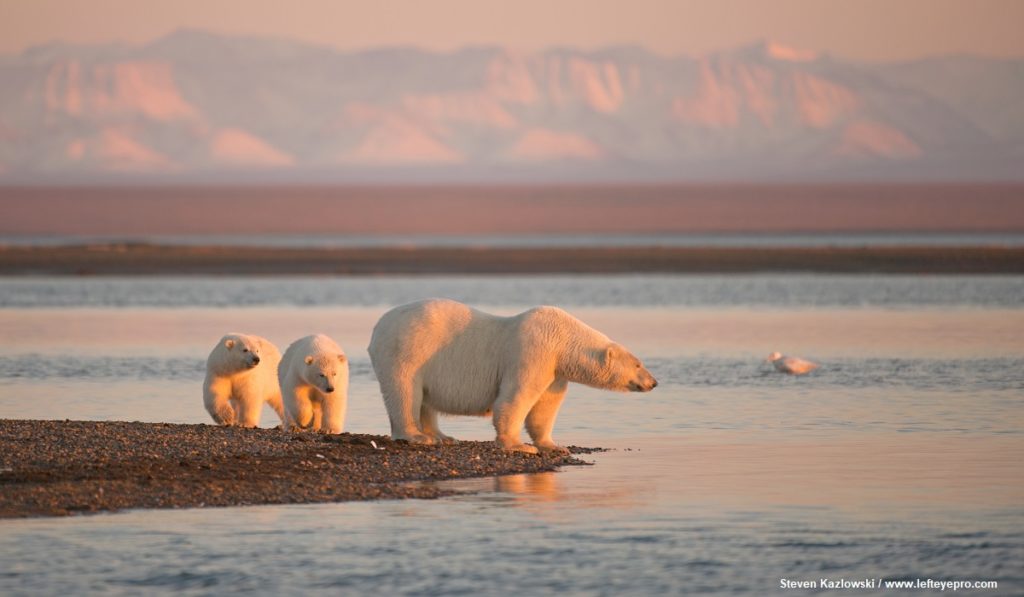Murkowski’s Broken Promises Continue To Grow

(This piece originally appeared in The Hill.) When drilling on the coastal plain of the Arctic National Wildlife Refuge was slipped into last year’s Republican tax bill, Alaska’s senior Sen. Lisa Murkowski (R) promised to: “Do it right. We will take care of our lands. We will take care of our wildlife. We will take care of our people.”
Those words ring hollow this week as the Trump administration has released its draft environmental impact statement in preparation for holding its first lease sale in 2019, even as it continues to push to allow seismic exploration across the entirety of the Arctic Refuge coastal plain. And the reason for the rush isn’t hard to piece together. In her own words, Murkowski told an Anchorage business meeting earlier this year: “There is a strong commitment [from the Trump administration] to work with us to get these leases out before the end of this term … because once you get those leases out into the hands of those who can then move forward, it’s tougher to throw the roadblocks in place.”
Her implication is that it would be tougher to challenge Arctic Refuge development if leases are already in the hands of Big Oil. This is a land grab, pure and simple, and the individuals responsible care little about impacts to wildlife or the damage they would be inflicting on Alaska Native people whose subsistence depends on the Arctic Refuge.
As for Murkowski’s promises to do it right — those promises were broken from the beginning.
Broken Promise No. 1: We will take care of our wildlife.
The Arctic Refuge’s coastal plain is the biological heart of America’s most iconic wildlife refuge. Birds from all 50 U.S. states raise their young there, alongside other species including caribou, muskoxen, polar bears and so much more.
More than three-quarters of the coastal plain has been designated as critical habitat for polar bears, who are increasingly using the area to build their dens as sea ice disappears due to climate change. And yet, BLM continues to push forward with a plan for seismic exploration that would likely frighten mother bears into fleeing from their dens, leaving cubs behind to perish.
The proposed seismic plan includes a small army of industrial vehicles and equipment with a mandate to crisscross every square inch of the coastal plain. Two 160-person worker “camps” with convoys of 90,000 lb. thumper trucks, tractors and bulldozers would roll over extensive areas of fragile tundra 24 hours a day, 7 days a week, for months.
The initial reaction by the U.S. Fish and Wildlife Service to the plan was to deem it inadequate, citing its “lack of applicable details for proper agency review.” A plan BLM is getting ready to rubber stamp.
Broken Promise No. 2: We will take care of our lands.
Trump administration officials are barreling ahead with plans for a 2019 lease sale while electing not to gather any new data about the Arctic Refuge that could inform a decision on drilling location. Instead, the EIS is based solely on existing data regardless of how incomplete it may be.
During the tax bill debate, U.S. Fish and Wildlife officials testified regarding lease sales that “two would occur four to five years from now, with drilling being potentially as far out as 7-10 years.” Not now.
The Trump administration has placed arbitrary deadlines and limitations on environmental reviews, and the Arctic Refuge’s EIS is set to be finished within one year with a strict page-limit, completely shortchanging the careful, deliberative review promised by Senator Murkowski and others. As Geoffrey Haskett, a former regional director for the U.S. Fish and Wildlife Service told the Washington Post: “The idea of imposing an arbitrary deadline like this is just horrific to me. I think they’re going to make mistakes because they’re moving so fast. They’re certainly not going to get much input on this.”
Broken Promise No. 3: We will take care of our people.
The Gwich’in people have relied on the Porcupine caribou herd for their way of life for thousands of years. For even longer, the Porcupine caribou herd has relied on the Arctic Refuge’s coastal plain as its annual birthing grounds. Protecting the caribou is a matter of basic human rights for the Gwich’in. Throughout this rushed, haphazard process, their concerns have been routinely minimized.
We stand with the Gwich’in people, and Congress must too. “Any threat to the coastal plain is a threat to the Gwich’in,” said Bernadette Demientieff, executive director of the Gwich’in Steering Committee. “The Interior should know that we will not be quiet and we will not be ignored. We will fight to protect the Arctic Refuge every step of the way.”
Adam Kolton is the executive director of Alaska Wilderness League.
